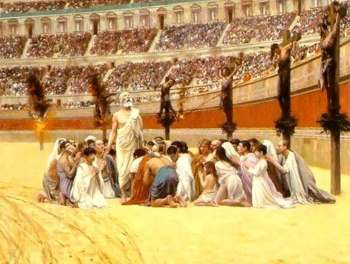 Articles in this section are from the past 6 to 12 months,
Articles in this section are from the past 6 to 12 months,
We have had a blessed week. Jamie Ritchie and Paul Anderson both received the best news from their oncologists. Five have been baptized in the last week. Then, last Saturday we dedicated our new Education Center, and began holding classes in it Sunday.
It was a particular blessing for me to share the moment of dedication with Max Goodgion, who sang at our wedding, and who has been a friend of our family since before either Teresa or I were born; and Owen Mullenax, who was an elder when I was hired by this congregation. Max is the last surviving elder from the time when we purchased our current property in 1978, and Owen was the one who found the property, and negotiated the sale for us. Max led the song “To God Be the Glory, Great Things He Hath Done,” and we all knew it was so. Since He was the first song leader in our current Auditorium, it was fitting that he should lead us in song as we dedicated our newest structure.
Owen’s prayer was especially stirring, and appropriate to the moment, and I would like to share it with you now. He began by quoting Solomon at the dedication of the Temple (I Kings 8.23): Lord God of Israel, there is no God in Heaven above or on earth below like you. Then he prayed this prayer:
“Our Father in Heaven, Hallowed be your great and holy Name. Thank you for the night’s rest, and for the day you have given us. This day, Father, we have come together to glorify and praise your name, and to thank You for being our God, our Creator, the Sustainer of life and all that is good.”
“Father, today we dedicate this new building to You, and we pledge to You that we will use this new building, and our entire facility to Your glory.”
“We thank You for being with this congregation from the very beginning, for providing us with good leaders - leaders who could see the need for this facility – and for strong members.”
“We thank You Father for each one who had a part in making this happen, but we know it all came from You. We can do nothing without You. Paul said: “I planted, Apollos watered, but God gave the increase.” Father in Heaven, we know it is the same this day. This new building, our existing building, our land, and all we have you have given to us.”
“So Father, today we come to say “thank You,” and to bring glory to your Name. In Jesus name, Amen”
In the coming days and weeks let us remember to pray our own version of this prayer of thanks. Let us, as well, never forget that every gift God gives, He expects to be used for His glory, and in the service of others.
Beloved, do not be surprised at the fiery ordeal that is taking place among you to test you, as though something strange were happening to you. But rejoice insofar as you share Christ’s sufferings, so that you may also be glad and shout for joy when His glory is revealed. If you are reviled for the name of Christ, you are blessed….if any of you suffer as a Christian, do not consider it a disgrace, but glorify God because you bear His name. I Peter 4.12-16.
 When Peter writes to Christians about the “fiery ordeal” they are enduring, he is not speaking metaphorically. Writing in the aftermath of the burning of Rome, Peter is addressing a Church identified as an enemy of the Empire. “Christian” is a label that describes criminal activity, like “murderer,” and “arsonist” do. Tacitus, in his Annals (Book Fifteen), reports that in the city of Rome, Christians were covered in pitch and burned alive – sometimes on high poles as luminaries for night-time revels.
When Peter writes to Christians about the “fiery ordeal” they are enduring, he is not speaking metaphorically. Writing in the aftermath of the burning of Rome, Peter is addressing a Church identified as an enemy of the Empire. “Christian” is a label that describes criminal activity, like “murderer,” and “arsonist” do. Tacitus, in his Annals (Book Fifteen), reports that in the city of Rome, Christians were covered in pitch and burned alive – sometimes on high poles as luminaries for night-time revels.
I Peter then is really a text-book of discipleship under pressure, a survival manual for times of persecution. In the passage above Peter is repeating what he heard Jesus say.
Blessed are those who are persecuted for righteousness’ sake, for theirs is the kingdom of heaven. Blessed are you when people revile you, and persecute you, and utter all kinds of evil against you falsely on my account. Rejoice and be glad, for your reward is great in heaven, for in the same way they persecuted the prophets before you. Matthew 5.10-11
Trials are a blessing because they produce a heavenly reward, and connect us with the heroes of faith who have gone before. This is what Jesus taught. This is what Peter believes. This is what he shares with fellow Christians in that turbulent decade of the 60’s, when Rome first recognizes Christians as enemies of the State.
Peter has earned the right to give this advice not just because he speaks truth, but because he has lived it. He knows what it is to face a “fiery ordeal” and pass the test. After He and John are seized by the Sanhedrin, beaten and threatened, they “rejoiced that they were considered worthy to suffer dishonor for the sake of the name” Acts 5.41.
He also knows what it is to hear the cock crow, and meet the eyes of Jesus after denying Him (Luke 22.54-62). Peter knows failure as well as triumph - his advice isn’t just academic – he has real-life experience.
That experience taught him this: when one suffers for the Name, one is qualified to wear the Name. That day early on, when he and John rejoiced together to be beaten for Jesus, I am certain he recalled the time he failed. I am also sure he remembered the words of Jesus then: “I have prayed for you that your own faith may not fail; and you, when once you have returned, strengthen your brothers” Luke 22.32.
“Strengthen your brothers,” Jesus said, and so he does as he pens these words from I Peter 4. They are strengthened, and so are we, as we are reminded together – by one who has earned the tight to say so – that we should be strong in the face of persecution. We should rejoice in the face of it. We rejoice because we know our reward is great and sure. We rejoice because we know that our endurance qualifies us to wear the Name of Christ.
Mike Hickman led singing last Sunday night. The Hickmans will be retiring away to Tennessee soon, and so we relish every chance we get to sing with Mike, having enjoyed him as one of our primary song-leaders for so long. Sunday night’s devotional was doubly memorable because at the beginning Mike was under attack. A horse-fly big enough to be a surveillance drone kept buzzing around his head. The fly interrupted service until he was successfully driven away.
 I was immediately reminded of a Sunday evening in May, 33 years ago. I was preaching both services at Bear Wallow, Ohio. My grandparents had driven up from Ceredo, WV to hear me. That evening I was the only man at service except for my grandfather, and so I had to lead singing (my grandfather’s voice had the quality of dentist’s drill – both sonically, and because it struck a nerve). The windows were open and this huge wasp flew in and kept hovering around my face. I thought, “Something that big ought to have a stewardess on it.” I kept shooing him away but he kept coming back to nose-level. I was leading “Trust and Obey,” which is in 3/4 time. I stepped back, and on the down beat I swatted the wasp to the floor. While he was buzzing there, stunned, I stepped forward and flattened him without skipping a beat or a word. The crunch was so loud I could hear it over the singing. No one else noticed - no one except my grandmother.
I was immediately reminded of a Sunday evening in May, 33 years ago. I was preaching both services at Bear Wallow, Ohio. My grandparents had driven up from Ceredo, WV to hear me. That evening I was the only man at service except for my grandfather, and so I had to lead singing (my grandfather’s voice had the quality of dentist’s drill – both sonically, and because it struck a nerve). The windows were open and this huge wasp flew in and kept hovering around my face. I thought, “Something that big ought to have a stewardess on it.” I kept shooing him away but he kept coming back to nose-level. I was leading “Trust and Obey,” which is in 3/4 time. I stepped back, and on the down beat I swatted the wasp to the floor. While he was buzzing there, stunned, I stepped forward and flattened him without skipping a beat or a word. The crunch was so loud I could hear it over the singing. No one else noticed - no one except my grandmother.
My grandmother had been watching. When the wasp went “CRUNCH” she started giggling, and she couldn’t stop. My grandma got that way sometimes. She would start giggling, and like a case of hiccups that won’t go away, she kept on giggling until it became a bit disturbing. We had a name for such a phenomenon. We called it “laying an egg.” “What’s wrong with Pauline, is she crying?” one might ask, only to be told, “No, she’s just laying an egg.” She giggled through the prayer, the sermon on Job, and the communion service. A few ladies were inclined to be offended until I told them she had “spells.” They promised to keep her in prayer.
This all swooped in with that horse-fly. I thought about how funny she could be. She had a great joke about a guy selling soap powders door to door, and another about a disembodied head floating down the river. I was about to start laying an egg myself, when I realized that I had completely zoned out. Although I was sitting in the auditorium of the Manassas Church of Christ, I was miles and decades away from being present at worship.
The Mosaic Law makes it clear: an offering to God must be without spot or blemish (Exodus 12.5, Leviticus 6.6). The offerings we bring to Him are not bulls, or lambs, or turtledoves but songs and prayers, meditation and devotion. The quality all these offerings share is focus. We must concentrate, and be attentive in order to make them acceptably. Oh, how easily our offerings become blemished.
Back in the days of the Mosaic covenant, the ability to offer a lamb without blemish would take a great deal of effort and attention. Such an animal would have to be identified, separated out, and lovingly cared for. Otherwise disease, predators, or life on the farm could mar an acceptable offering. Nothing has changed. If we are to bring the Father an unblemished offering, we must worship Him intentionally, attentively, and devotedly.
One reads the great, universe-encompassing song of praise offered at the end of Revelation 5 and one is sure no one singing “Worthy is the Lamb” is wondering who might be pitching for the Nationals today. The immediate presence of God, which fills the universe, leaves no room for such thoughts.
May we be like the prophet in Isaiah 6, who went to the temple and found God there. Our gathering together, wherever that gathering be, is God’s temple. May we be blessed with the same experience of His presence. Only then will we offer our best.
 Since you call on a Father who judges each man’s work impartially, live your lives as strangers here in reverent fear. For you know that it was not with perishable things such a silver and gold that you were redeemed from the empty way of life handed down to you from your forefathers, but with the precious blood of Christ, a lamb without blemish or defect. He was chosen before the creation of the world, but was revealed in these last times for your sake. Through Him you believe in God, who raised him from the dead and glorified him, and so your faith and hope are in God. I Peter 1.17-21.
Since you call on a Father who judges each man’s work impartially, live your lives as strangers here in reverent fear. For you know that it was not with perishable things such a silver and gold that you were redeemed from the empty way of life handed down to you from your forefathers, but with the precious blood of Christ, a lamb without blemish or defect. He was chosen before the creation of the world, but was revealed in these last times for your sake. Through Him you believe in God, who raised him from the dead and glorified him, and so your faith and hope are in God. I Peter 1.17-21.
We all think we want to know the future. We could make lots of money from bookies and brokers (is there a difference?), if we knew, ahead of time, which horse or which stock would perform better than expected. But do we really want to know? How would we behave differently if we know the future? If I knew for certain that 5 years from now I will develop a melanoma would I double down on the sunscreen? Would an extra, daily layer of SPF 50 prevent the melanoma? It could be that there is an ingredient in the sunscreen that will be found to be carcinogenic – thus my action to avoid the cancer could actually achieve the future I sought to change.
This is exactly what happened to Oedipus. In trying to avoid the destiny given to him, he fled to what he thought was a foreign country, and actually made possible the fulfillment of the prophecy that he would kill his own father.
There was a television program a few years back called Early Edition in which a stock broker got the morning paper a day ahead of time. He saw the headline for the next day, and then spent the next hour rearranging things to avert catastrophe. I doubt things would work that way. I think Rod Serling had it right. In two Twilight Zone episodes: “A Most Unusual Camera” from season 2, and “What’s in the Box” from season 5, people who are given a glimpse of their futures, are powerless to escape them.
In the first, a group of horse players get a Polaroid camera that takes snaps of the future. They use it to photograph the board at a race track, in order to see the win, place, and show horses ahead of time. In the second, William Demarest can see the near future of his tawdry life on his own television. In both episodes bad people come to bad ends because of their bad behavior despite seeing the future. This is a more probable outcome of human foreknowledge.
The passage above is about redemption. We are saved because Jesus was sacrificed for us- a spotless, innocent Lamb. His death accomplishes our salvation, the possibility of faith, and Jesus’ own glorification. Our sin necessitates Jesus’ death. We know this. It is the central truth of Christianity. The passage above is also about foreknowledge. It tells us that God knew Jesus would die before we were even created.
He was chosen before the foundation of the world (I Peter 1.20).
God knew before He said “Let there be light” that Jesus would have to die – and He created us anyway. God knew ahead of time that most of us would reject the salvation Jesus’ death provides – and He created us anyway. God knew that most of us would allow the spirit He puts in us to die and to stay dead – and He created us anyway. Amazing. This is the outcome of Divine foreknowledge.
Any speculation about the possibility of human foreknowledge is futile – none of us will ever have it; and unnecessary – God has already told us the outcome of things. Are we sufficiently in awe of a God who loves us enough to create us, despite knowing how much hurt we would bring?
 There is a new phenomenon happening in Japanese culture. People are gathering in groups to view, for 40 minutes or more, sad commercials and videos for the purpose of having a group weep. These events are called rui-katsu, or “tear seeking.” These events have been held at mental health centers across Tokyo beginning in 2013. Organizer, Hidefumi Yoshida, claims that crying “clears the mind and reduces stress.” The crying must be done in a group, however to achieve the desired effect. Some think that these events are so popular in Japan because of 37 nationalities polled, the Japanese are the least likely to cry. Americans are among the most likely to cry.* What would John Wayne think about that?
There is a new phenomenon happening in Japanese culture. People are gathering in groups to view, for 40 minutes or more, sad commercials and videos for the purpose of having a group weep. These events are called rui-katsu, or “tear seeking.” These events have been held at mental health centers across Tokyo beginning in 2013. Organizer, Hidefumi Yoshida, claims that crying “clears the mind and reduces stress.” The crying must be done in a group, however to achieve the desired effect. Some think that these events are so popular in Japan because of 37 nationalities polled, the Japanese are the least likely to cry. Americans are among the most likely to cry.* What would John Wayne think about that?
We are reminded in Ecclesiastes 3.4 that there is a time to cry. The New Testament not only accepts that weeping is part of the human experience in this sinful world, but encourages us to share in each other’s tears: Rejoice with those who rejoice, weep with those who weep (Romans 12.15). Jesus certainly models such behavior. He appreciates and values the tears of the prostitute who washes his feet with those tears (Luke 7.38), and when he sees Mary of Bethany crying at his feet for her dead brother Lazarus he weeps as well (John 11.35). I really love that in the versification of the New Testament, those 2 words, “Jesus wept,” are set apart as a single verse. They stand apart like a monument to His humanity, His empathy, His love.
In John 11 Jesus is joining a group weep. Mary is surrounded by family, and friends who have come to support her, cry with her. The text tells us that Mary’s tears, along with the weeping of the others cause Jesus to become so disturbed that He trembles (v.33). His first response (the response of almost any man to a woman’s tears), is to get about making things better. He says, “Where have you laid him?” (v.34). But before He can head to the tomb, his emotions overwhelm Him and He cries with them.
It is Jesus’ impulse to fix things when He sees a woman crying. This is not only true for those he knows well, but for complete strangers. In Luke 7.11-17, as He is entering the city of Nain, a large funeral procession is leaving it. The funeral is for the deceased only son of a widowed mother. When Jesus sees her He has a visceral reaction, and says “Don’t cry” (v.13). Then He raises her son from the dead.
In Isaiah 25, the prophet is singing a song of praise for all the blessings Yahweh will bestow when the Messiah comes. He writes, “He will swallow up Death for all time, and the Lord GOD will wipe away tears from all faces” (v.8). Revelation 21.4 refers to this specific promise, and says it will happen when Jesus comes again. This group weep occurs after Jesus has descended, but before God declares “I am making all things new” (Revelation 21.1-5). The weeping is universal among the saved, but the experience ending this final group weep, although experienced by all, is very personal. It is tactile. It involves God touching each individual face. We have all seen and experienced the gesture – a thumb on the cheek, wiping away a tear. John tells us the bliss of eternity begins with God’s thumb upon our cheek, banishing tears forever.
Jesus tells us of another reality going on at the same time. In His last major sermon, the one in which He talks about final judgment, He describes being severed from God as a place of “outer darkness,” where there is “weeping and gnashing of teeth” (Matthew 25.30). This is a group weep which will not “clear the mind and reduce stress.” It will not end with the caress of God’s comforting hand.
At the end of the universe, of space and time, there will be two groups – both weeping. One will be comforted, and weep no more. One will weep forever. Each of us will be in the group we have chosen.
* “Crying it Out,”by Patrick St. Michel in The Atlantic, May 2015, p.23.



